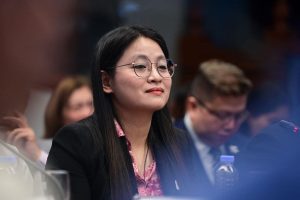Philippine authorities say that Alice Guo, a disgraced small-town mayor being investigated for her alleged ties to Chinese criminal syndicates, may be seeking to escape to the Golden Triangle to evade the reach of the law.
Guo, the former mayor of Bamban, a town in Tarlac province, is at the center of an ongoing Senate investigation that is examining her links to Chinese-run Philippine Offshore Gaming Operators, known commonly as POGOs. The investigation began in May, following raids on two illegal POGOs that were operating from properties in Bamban allegedly owned by a company belonging to Guo.
The raid in March resulted in the arrest of nine individuals allegedly involved in online scam operations and illegal human detention and rescued more than 800 victims of human trafficking who were believed to have been forced to run the scams.
Since giving testimony to the Senate investigation in May, however, Guo has disappeared. In July, Senate President Francis Escudero signed warrants for the arrest of the former mayor and several members of her family, after ignoring a subpoena to appear again before a Senate investigation in Manila. Guo claimed that she had been traumatized and appealed to the Supreme Court to stop the committee from questioning her further.
Last week, the Presidential Anti-Organized Crime Commission (PAOCC) confirmed that Guo had left the country, most likely in July, and ordered authorities to cancel her Philippine passport. The revelation prompted President Ferdinand Marcos Jr. to promise that “heads will roll” for allowing Guo to slip through the net.
Yesterday, PAOCC spokesperson Winston Casio said that investigators believe that Guo is seeking sanctuary somewhere in mainland Southeast Asia.
“We are confident that she is trying to get into the Golden Triangle,” he said, according to a report by ABS-CBN News. While the phrase usually refers to the rugged region where the borders of Thailand, Laos, and Myanmar converge, Casio’s comments appear to suggest that Guo’s final destination may be Cambodia. He alleged that the Guo family “has business interests in Cambodia” and “are part of a big criminal organization.”
According to Casio, the PAOCC’s investigations showed that Guo was last seen in the Philippines on July 14 in a resort in the “westernmost tip” of the country – presumably in Palawan. He cited a source in the area as saying that Guo was seen boarding a speed boat. She then surfaced in Bali, Casio said, where she boarded a flight on July 17 for Kuala Lumpur. PAOCC has previously disclosed that Guo then flew to Singapore on July 21, and traveled to the Indonesian island of Batam via ferry on August 18. It appears she remains there, awaiting the opportunity to continue on to the Mekong region.
The PAOCC’s disclosure marks the latest twist in the strange story of Alice Guo, the investigation of which has produced a string of sensational revelations that have captivated people across the Philippines. Since the beginning of the investigation in May, Senator Risa Hontiveros, who is leading the investigation, has presented documents showing that Guo is actually a Chinese national named Guo Huaping, who was born in China and only arrived in the Philippines as a teenager in the 1990s. She then faked a birth certificate showing that she was born in Tarlac, before running successfully for local office in Bamban. Investigators also claim that billions of pesos were deposited in Guo’s bank accounts, which were then transferred to the accounts of other individuals and business entities. Most of the money came from individuals and entities in China.
If Guo is guilty of what investigators claim – she denies all of the charges against her – her flight to mainland Southeast Asia would not be surprising. The region has been the epicenter of the global crypto-fraud “pig butchering” operations that are now believed to be generating billions annually in illicit revenues. These scam operations have flourished in parts of the Mekong region where state jurisdictions are most accommodating. These include special economic zones in Laos and rebel-controlled enclaves in Myanmar. They are also widespread in Cambodia, where they reportedly enjoy the protection of officials at the highest ranks of government.
Most cyber-fraud operations have been sustained by armies of indentured workers: innocent jobseekers who were attracted by promises of clean and legitimate employment, only to be kept imprisoned and forced to operate various types of digital scams, often on pain of beatings, mistreatment, and torture. Most are run by Chinese criminal syndicates with a transnational presence and reach.
If Guo colluded with one such syndicate to set up scam operations under POGO fronts in Bamban, it is conceivable that she would enjoy support in escaping from the Philippines. The revelation that Guo’s family has business interests in Cambodia, a country that is awash in dirty Chinese money and which has relatively limited trade and investment contact with the Philippines, certainly seems to reinforce investigators’ claims.
When asked if Philippine authorities could pursue Guo if she enters the Golden Triangle, the PAOCC’s Casio said: “It depends where in the Golden Triangle she would land… Those countries are very porous in terms of boundaries.” He added, “We will answer the question when we get there, [but] we have to prevent that from happening.”
































